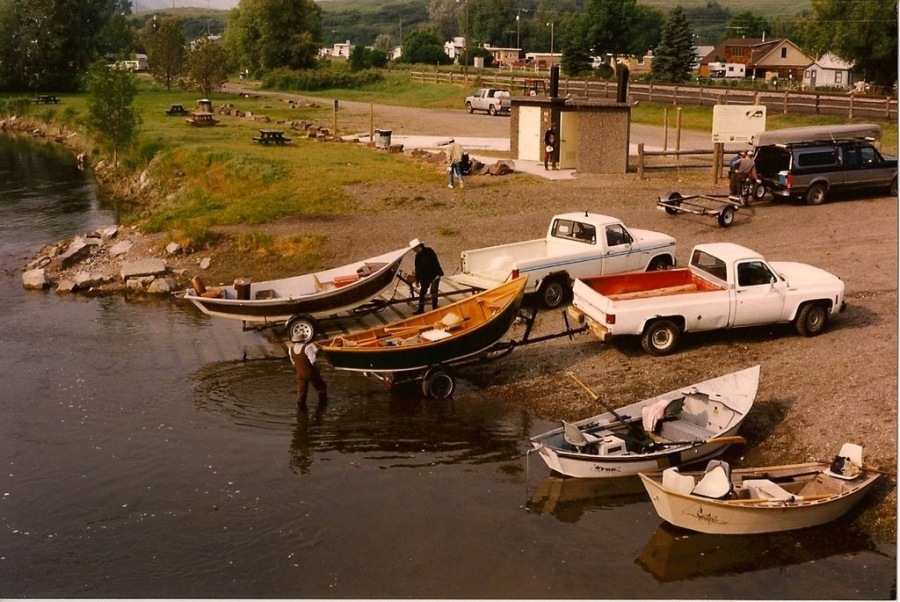Opportunities Lost and Found

Suicide rates remain high, despite a multitude of "friends" on Facebook. Depression and anxiety, often associated with limited social activity, are being diagnosed and medically treated at an alarming rate, to the detriment of our physical and environmental health, also despite opportunities to interact with "friends" online.
There is a lot of value in our online networks, and many people are using the platforms as complements to their face-to-face activities.
Many have lost their ability to have face-to-face conversations and communicate effectively beyond the keyboard.
Our neighbors and community members have lost the skills to resolve conflict -- and the will to address conflict face-to-face.

I parked our car in the lot and walked over to a neighbor's truck to find out why they hadn't backed into the boat ramp to put their drift boat into the water:
"There's a group down there, camped in the middle of the ramp! They've been there for so long, just hanging out with their boats. They even walked away, leaving the gear, to get beer from the shop down the road!"I asked my friend if they had spoken to the people on the ramp and asked them to move.
Ugh. No. I don't want a confrontation. Then we'll have to deal with them on the river.
Our younger son was with me, and as we walked toward the boat ramp, he asked what I planned to do.
I'm going to ask them to move.With a smile on my face, I tapped the arm of the man near the boat:
"Excuse me. Is this your boat?"
"No. But I'm with the people it belongs to. Why?"
He sounded a little defensive.
There are three trucks waiting to put their boats in the water, and they can't because of this gear. I'd love to help you move it, there's plenty of room just a few feet to your left.
And as I spoke the last sentence, I smiled broadly and reached for the handle at the back of the paddle boat.
With a slightly puzzled expression, he went around to the other side to help me move the boat. And the others in the group started to move the coolers and gear blocking the ramp.
"Thank you so much! I really appreciate your flexibility and help."
"Yeah, of course, no problem." -- He almost smiled.
My son and I walked away and watched as our neighbor backed the truck onto the ramp to put the boat into the water.
Mom, that didn't seem like such a big deal. It was like he had to help you, you didn't give him another option. That was cool.
Our neighbor didn't want to confront this group. Why? Because we can't predict how someone will react when we confront them. My answer is always to use my pleases and thank yous, treat people respectfully and make sure they understand why I'm asking them to do something. When I can, I offer to help, so they know I'm not asking them to do something I wouldn't do myself.
There are simple strategies to connect and improve communication:
- Don't forget your pleases and thank yous.
- Be considerate of the people around you -- always.
- Be considerate when you are asking someone for something, know what you are asking, and the kind of investment you are asking from that person. Be prepared for them to turn you down. Be okay with that and have a backup plan.
- Pay attention to the small kindnesses you offer and receive; open doors for people, wave when someone in traffic lets you merge, be genuine in your interactions.
- Be kind -- online and offline. It's not that hard, be intentional about it.
- Smile, especially when you're asking for something.

Sarah Elkins is a professional coach and consultant, helping people and businesses improve their communication through the art of storytelling. She's also the President of Elkins Consulting, the company making a splash with small, face-to-face, affordable interactive conferences called No Longer Virtual.
*Top and bottom photos taken on the Missouri River between Wolf Creek and Craig, Montana
*Boat launch photo courtesy of Kyle Bowerman on Panoramio
Articles from Sarah Elkins
View blog
A Laundry List of "Wants" Leads to Arbitrary Boundaries and Limits Opportunities · My friend was tel ...

This week Arnie McKinnis · challenged a group of writers to publish a piece on the topics of distrac ...

Do you feed people? Or do you nourish · them? · We were listening to a sermon following a beautiful ...
Related professionals
You may be interested in these jobs
-

VP of Construction
Found in: Lensa US 4 C2 - 1 day ago
Kimmel Associates Vero Beach, United StatesAbout the Position: · This is an executive position opportunity to oversee all construction for a privately owned general contractor on the east coast of FL. The company has been in business and very successful for 30+ years now. They have an excellent team and a strong reputatio ...
-

Psychologist to treat anxiety, depression
Found in: Handyman CS US - 10 hours ago
Direct apply
beBee Handyman Cottonwood, AZ, United States FreelanceI am in need of a Psychologist service with the following characteristics in Cottonwood, AZ:What does the patient feel? · Anxiety, depression · What type of specialist is needed? · I don't know · How old is the patient? · Adult · Is this service for you or for someone else? · It ...
-
Front Desk Supervisor
Found in: Lensa US 4 C2 - 2 days ago
Stanford Hotel Group Boca Raton, United States** Front Desk Supervisor** · **Job Category****:** Front Office **Requisition Number****:** FRONT05157 Showing 1 location **Job Details** · **Description** · Job Overview: · Assisting the Front Office Manager in the day to day operations of the front desk while ensuring 100% ...


Comments
Sarah Elkins
7 years ago #4
And to answer your question (oops), it's most of what you mention, but I'm not convinced of #3. Self-absorbed, yes, but I think given an opportunity, most of us care passionately about things that impact our lives. I also think the pendulum on that behavior is starting to swing the other direction, based on the reading I've been doing about the growth of business models that include sustainability, employee engagement, and personal responsibility strategies. Yes, I'm an optimist, I own that!
Sarah Elkins
7 years ago #3
I'm not so sure it's age related, , my neighbor is my age. I think it has more to do with our lack of self control when it comes to our electronic devices. The more we get sucked into them, the less we practice our in-person social skills. As a parent, it's something I've been working on for years. It recently occurred to me that I can persuade and guide other adults about this, too. We have to be good ambassadors. I'm really enjoying Melissa Hughes' book, Happy Hour with Einstein. Her book offers a high level description of how certain interactions, activities, and messages impact the actual structure and chemical make-up of our brains. It's given me a lot of ideas to implement at work and at home.
David B. Grinberg
7 years ago #2
Sarah Elkins
7 years ago #1
Thank you, Deb Helfrich, for your comments. It's just so puzzling to me how people can be so supportive and eager online, and then be completely the opposite person face-to-face. Strange.